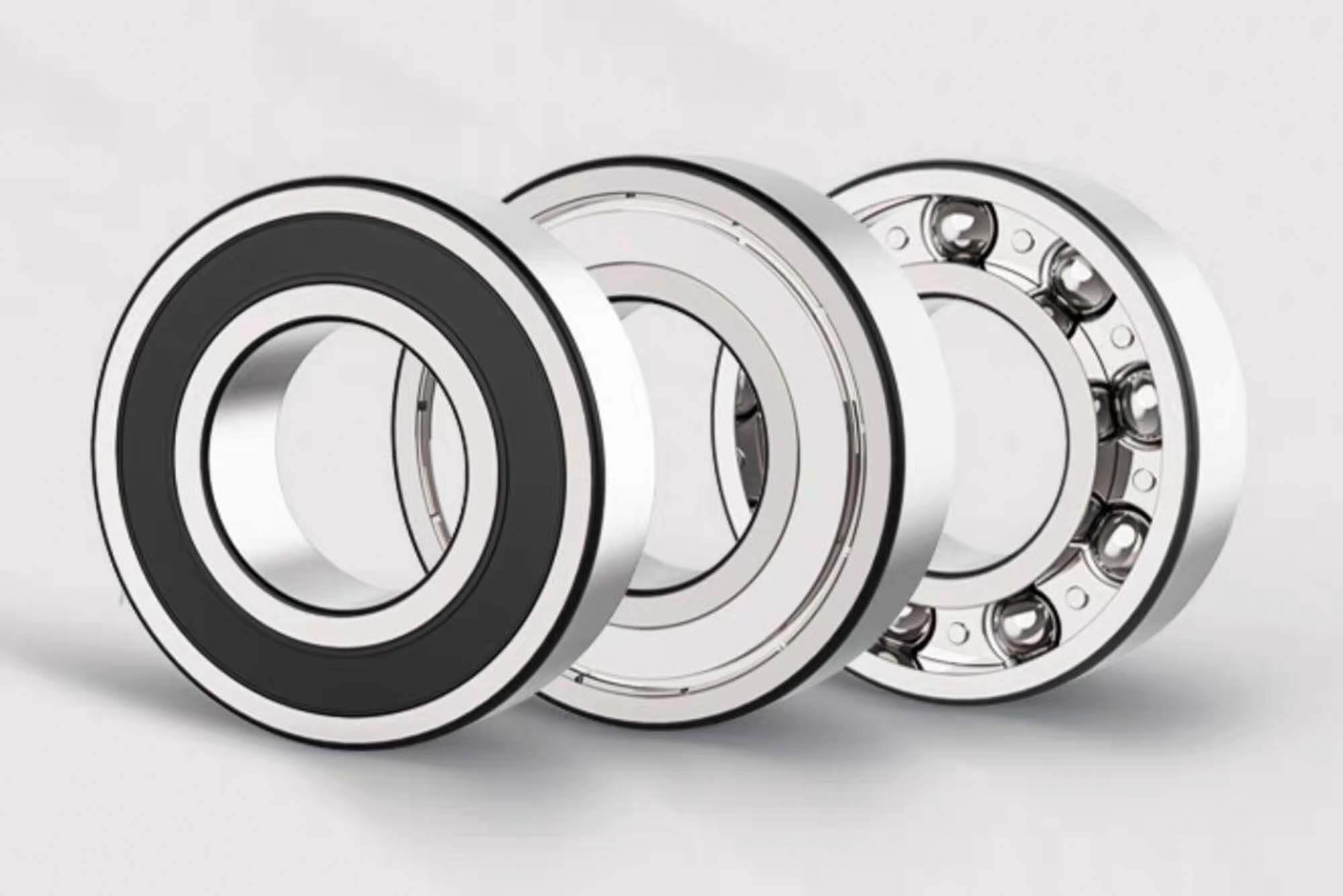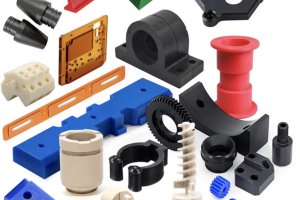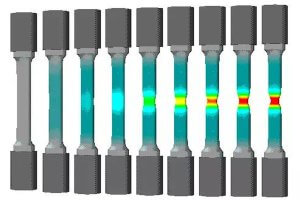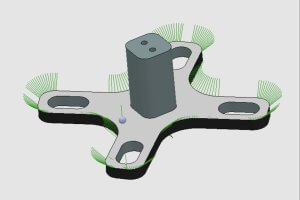In the world of manufacturing, precision is everything, especially when it comes to crucial components like hub bearings. As someone with years of experience working with CNC machining, I’ve had numerous encounters with clients requiring custom-made hub bearings for various applications. This article will explore why CNC machining is the perfect solution for manufacturing high-precision hub bearings and how the process works from start to finish.
Understanding Hub Bearings and Their Function
Hub bearings are essential components in many mechanical systems, particularly in automotive applications, where they are responsible for connecting the wheel to the vehicle’s axle and allowing it to rotate smoothly. These bearings must endure significant stress and friction, making precision in their design and production crucial.
Table 1: Common Applications of Hub Bearings
| Industry | Application | Hub Bearing Type | Material | Key Requirement |
|---|---|---|---|---|
| Automotive | Wheel assemblies | Tapered roller | Steel/Alloy steel | High load capacity |
| Aerospace | Landing gear systems | Angular contact | Titanium | Lightweight, high strength |
| Industrial | Conveyor systems | Deep groove ball | Stainless steel | Corrosion resistance |
| Agriculture | Heavy-duty machinery | Spherical roller | Carbon steel | Durability under stress |
| Wind Energy | Turbine assemblies | Cylindrical roller | Alloy steel | High rotational speed |
| Mining | Heavy equipment | Tapered roller | Cast iron | Impact resistance |
Hub bearings are more than just components; they are the foundation that ensures the smooth operation of critical systems. Without high-quality, precision-engineered bearings, everything from cars to wind turbines could face severe operational inefficiencies, or even failure. In my own experience, I’ve seen how slight imperfections in a bearing’s design can lead to serious performance issues down the line.
Why Custom Hub Bearings Require CNC Machining
Custom hub bearings often require specialized production techniques, and CNC (Computer Numerical Control) machining stands out as the most suitable method for a variety of reasons. Unlike conventional manufacturing processes, CNC machining offers the precision, flexibility, and efficiency necessary to meet the unique demands of custom hub bearing designs. This chapter will explore the technical reasons behind why CNC is essential for custom hub bearing production, delve into real-world examples, and provide an expanded understanding of the advantages that CNC machining brings to the table.
2.1 Precision is Paramount
The primary reason CNC machining is essential for custom hub bearings lies in the level of precision it can achieve. Hub bearings are subject to significant forces, high levels of friction, and constant rotational motion, which means even the smallest deviation in dimensions can lead to performance issues such as overheating, excessive wear, or complete failure. CNC machines are capable of maintaining extremely tight tolerances, often within ±0.001 mm. This level of precision ensures that each bearing fits perfectly within its housing, allowing it to rotate smoothly and consistently under heavy loads.
In my own experience, I’ve seen firsthand how the precision of CNC machines can make or break a custom bearing project. For instance, one client in the automotive industry required a custom hub bearing for a high-performance sports car. The bearing needed to withstand both high speeds and heavy loads, and there was absolutely no room for error. Thanks to the tight tolerances achievable with CNC machining, we were able to produce a bearing that not only met the client’s specifications but also exceeded their performance expectations.
2.2 Flexibility in Design and Material Choice
CNC machining offers unparalleled flexibility when it comes to the design and materials used in custom hub bearings. Unlike traditional machining processes, CNC allows for complex geometries that might otherwise be impossible or prohibitively expensive to produce. This flexibility is crucial when designing bearings for specialized applications, such as in the aerospace or high-performance automotive sectors.
Moreover, CNC machining can handle a wide range of materials, including:
- Steel and Alloy Steel: Common in automotive applications due to its strength and wear resistance.
- Stainless Steel: Favored for its corrosion resistance, particularly in industrial and marine environments.
- Titanium: Lightweight and extremely strong, titanium is often used in aerospace applications where weight savings are critical.
- Ceramics: For applications that require extreme hardness and temperature resistance, ceramic materials can also be machined using CNC technology.
In my past projects, I’ve often worked with clients who needed custom hub bearings made from non-standard materials. One such case involved a client in the wind energy industry, who needed a bearing that could withstand high rotational speeds and extreme environmental conditions. The solution was to use a specialized alloy steel that could offer both durability and corrosion resistance. CNC machining allowed us to create a custom bearing that met these stringent material requirements while maintaining the necessary precision.
2.3 Efficiency and Cost-Effectiveness
While CNC machining might initially seem like a more expensive option compared to traditional manufacturing methods, it actually offers long-term cost savings through improved efficiency and reduced waste. CNC machines are highly automated, which reduces the potential for human error and speeds up the production process. Once a design is programmed into the machine, it can produce large quantities of bearings with minimal variation, ensuring consistent quality across every unit.
Additionally, CNC machining is a subtractive process, meaning that material is removed from a larger block to create the final product. This method allows for precise material usage, reducing waste and ultimately lowering material costs. CNC’s efficiency becomes especially apparent in custom hub bearing projects that require small to medium batch sizes, as setup times are reduced, and production can be scaled up or down as needed.
2.4 Scalability for Prototyping and Mass Production
Another reason CNC machining is ideal for custom hub bearings is its scalability. Whether you need a single prototype for testing or thousands of units for mass production, CNC machining can easily adapt to the scale of the project. For prototyping, CNC machining allows for quick iterations and adjustments, which is particularly useful when testing new designs or materials. Once the prototype is approved, the same CNC machine can be used to produce the bearings in larger quantities, ensuring that the final product matches the prototype exactly.
In my experience, I’ve seen how this scalability benefits clients across industries. A client in the aerospace industry approached me with a need for a custom hub bearing prototype made from titanium. After producing and testing the prototype, the client requested a small production run for further testing in real-world applications. CNC machining allowed us to seamlessly transition from the prototype phase to low-volume production without having to retool or change machines, saving both time and money.
Table 3: CNC Machining Advantages for Custom Hub Bearings
| Key Advantage | Traditional Methods | CNC Machining |
|---|---|---|
| Precision | Lower tolerances | Extremely high tolerances (±0.001 mm) |
| Design Flexibility | Limited | Complex geometries possible |
| Material Options | Limited | Wide range of materials, including exotic metals |
| Production Scalability | Limited | Scalable from prototyping to mass production |
| Waste and Material Efficiency | High | Low (subtractive process reduces waste) |
| Time and Cost Efficiency | Longer lead times | Faster production, especially for small batches |
2.5 Case Study: High-Performance Automotive Bearings
One notable example from my own experience involved a client in the high-performance automotive industry. They required custom hub bearings capable of withstanding extreme heat and friction during high-speed races. Using CNC machining, we were able to create bearings from a specialized heat-treated alloy steel. The precision of the CNC machine ensured that the bearings would maintain their integrity even under the most demanding conditions.
Through CNC machining, we were able to deliver bearings that significantly outperformed the client’s previous parts, reducing wear and increasing the lifespan of their racing components. This project underscored the importance of CNC in delivering custom solutions where precision, material selection, and durability are paramount.
The Custom Hub Bearing Production Process with CNC
The production process for custom hub bearings begins with a deep understanding of the client’s needs. Whether they require specific materials, dimensions, or performance characteristics, CNC machining can accommodate these requests efficiently. Here’s an overview of the typical production workflow:
- Design Consultation: During this phase, we work closely with the client to understand the specific application and performance requirements for the hub bearing.
- CAD Modeling: Once the requirements are clear, a precise 3D model of the bearing is created using CAD software.
- Material Selection: Depending on the application, we choose materials such as steel, alloy steel, or even more exotic metals like titanium.
- Machining Process: Using the CAD model, CNC machines precisely cut and shape the hub bearing, ensuring that all measurements are accurate to within microns.
- Quality Control: After machining, each bearing is thoroughly inspected for any imperfections, and tests are conducted to ensure it meets performance standards.
Table 2: Typical CNC Tolerances for Hub Bearing Production
| CNC Machine Type | Material Processed | Tolerance Level (mm) | Surface Finish (Ra) | Application |
|---|---|---|---|---|
| 5-Axis CNC Mill | Steel, Alloy Steel | ±0.005 | 0.4 µm | High-precision auto bearings |
| CNC Lathe | Stainless Steel | ±0.002 | 0.6 µm | Aerospace bearing components |
| Wire EDM | Titanium, Inconel | ±0.001 | 0.3 µm | Custom industrial bearings |
| CNC Grinding Machine | Carbon Steel | ±0.0005 | 0.2 µm | Heavy-duty bearings |
| Horizontal CNC Machine | Cast Iron | ±0.007 | 0.8 µm | Mining and agricultural bearings |
| Vertical CNC Machining Center | Aluminum | ±0.003 | 0.5 µm | Wind turbine bearings |
In my experience, one of the most critical steps in the process is material selection. I’ve had instances where using the wrong material led to early wear and failure in the bearings. For example, in high-load applications like mining, choosing a material that can withstand extreme forces and abrasive conditions is essential.
How CNC Machining Enhances Hub Bearing Performance
The performance of a hub bearing is directly tied to its design, materials, and manufacturing process. CNC machining plays a pivotal role in optimizing each of these aspects to deliver superior hub bearing performance. From ensuring perfect symmetry to maintaining consistent quality across multiple units, CNC machining offers several advantages that make it the preferred choice for custom hub bearings.
4.1 Enhanced Precision for Longer Lifespan
Hub bearings are subjected to continuous rotational motion and high loads, making precision an essential factor in their durability. CNC machining’s ability to maintain precise tolerances ensures that each component of the bearing is perfectly aligned, which reduces friction, heat buildup, and wear. This directly translates into a longer lifespan for the bearing, even in demanding environments.
From my own experience, I recall a project where a client from the industrial equipment sector required custom hub bearings for heavy-duty conveyor systems. These systems operate continuously and often in harsh conditions. By using CNC machining to ensure precise tolerances and surface finishes, we were able to create bearings that significantly outlasted the client’s expectations, reducing the need for frequent replacements and maintenance.
4.2 Improved Surface Finish for Reduced Friction
One of the less obvious but equally important aspects of hub bearing performance is the surface finish. A smoother surface reduces friction between the moving parts of the bearing, leading to lower operating temperatures and less wear over time. CNC machining offers unparalleled control over the surface finish of the final product, allowing for customized finishes that optimize the bearing’s performance.
For example, in high-speed automotive applications, even minor surface imperfections can cause heat buildup, which degrades the performance of the hub bearing over time. CNC machines can achieve surface finishes as smooth as Ra 0.2-0.3 µm, significantly reducing friction and ensuring that the bearing operates efficiently.
Table 4: Typical Surface Finish Levels Achievable with CNC Machining for Hub Bearings
| Machining Process | Typical Surface Finish (Ra µm) | Application Example |
|---|---|---|
| CNC Grinding | 0.2-0.3 µm | High-performance automotive hub bearings |
| CNC Lathe Turning | 0.6-0.8 µm | Industrial machinery bearings |
| CNC Milling | 0.4-0.6 µm | Aerospace hub bearings |
| Wire EDM | 0.1-0.3 µm | Precision medical bearings |
4.3 Material Selection and Customization
Different applications require different materials for their hub bearings. CNC machining offers the flexibility to work with a wide range of materials, from traditional steel alloys to more advanced materials like ceramics and titanium. This versatility allows manufacturers to choose the best material for the job, ensuring that the bearing performs optimally under specific operating conditions.
For instance, in aerospace applications, where weight is a critical factor, using lightweight materials such as titanium can improve fuel efficiency and overall performance. However, machining titanium is notoriously difficult due to its toughness and tendency to cause tool wear. CNC machines, with their advanced cutting tools and precise control, are well-suited to handle such challenging materials, delivering high-quality, high-performance hub bearings.
4.4 Consistency Across Production Batches
One of the biggest advantages of CNC machining is its ability to produce identical parts consistently, even across large production runs. This consistency is vital for hub bearings, where even the slightest deviation in dimensions can lead to operational issues. CNC machines are programmed with exact specifications, ensuring that every bearing produced meets the same high standards of quality and precision.
I’ve worked on projects where clients needed hundreds of custom hub bearings for industrial machinery. Thanks to CNC’s repeatability, we were able to deliver every unit with the same precision and quality, ensuring that each bearing performed exactly as expected, regardless of the batch size.
4.5 Durability in Extreme Conditions
CNC machining allows for the creation of hub bearings that can withstand extreme conditions, such as high temperatures, corrosive environments, or heavy loads. By combining precision machining with advanced materials, CNC machines can produce bearings that offer superior durability compared to those made using traditional methods.
One example from my experience involved a client in the oil and gas industry, who required hub bearings for offshore drilling equipment. These bearings had to withstand high pressures and corrosive saltwater environments. By using CNC machining to create bearings from corrosion-resistant stainless steel and applying specialized surface coatings, we were able to produce bearings that offered exceptional durability, even in these extreme conditions.
4.6 Real-World Case Study: Aerospace Hub Bearings
One of the most challenging projects I’ve worked on involved creating custom hub bearings for an aerospace client. The bearings needed to be lightweight yet strong enough to withstand the intense forces experienced during flight. CNC machining allowed us to precisely shape the bearings from titanium, ensuring that they met both the weight and strength requirements.
The client was particularly impressed with the consistency of the bearings across multiple production runs. Despite the complexity of the design and the challenging material, CNC machining delivered bearings that performed flawlessly in real-world tests, further solidifying the reputation of CNC as the go-to method for high-performance bearing production.
The Growing Demand for Custom Hub Bearings
As industries continue to evolve, so too does the demand for custom hub bearings. Whether it’s in automotive, aerospace, or renewable energy sectors, the need for high-precision, high-performance bearings is rising.
From my own experience, clients are increasingly looking for customized solutions that meet their exact needs rather than relying on off-the-shelf products. This shift towards customization is largely driven by CNC’s ability to produce complex parts with unparalleled precision.
Selecting the Right CNC Supplier for Hub Bearing Manufacturing
Choosing the right CNC supplier is crucial for ensuring that your hub bearings meet the highest standards of quality and performance. When selecting a supplier, I always advise considering the following factors:
- Experience: A supplier with experience in machining hub bearings will be better equipped to meet specific requirements.
- Equipment: Ensure the supplier has state-of-the-art CNC machines capable of producing bearings to the required tolerances.
- Quality Control: Check if the supplier has robust quality control processes in place, including inspection and testing at every stage of production.
- Lead Time: Discuss lead times upfront to ensure the supplier can meet your project deadlines.
In my own projects, I’ve learned the importance of partnering with a supplier who not only understands CNC machining but also has specific expertise in hub bearing production.
FAQ – Custom Hub Bearings and CNC Machining
- What is a custom hub bearing, and why choose customization over standard products?
Explains the scenarios that require custom hub bearings, especially when standard parts cannot meet application needs. - What materials can be used to make custom hub bearings?
Provides information on material options like alloy steel, stainless steel, aluminum alloys, and explains the advantages and applications of each. - What are the benefits of custom hub bearings manufactured using CNC machining?
Describes the precision, repeatability, and ability to handle complex geometries with CNC machining, ensuring high performance and quality. - What is the production process for custom hub bearings?
Details the entire process from customer requirements, design, prototyping, to mass production, helping customers understand each step in the customization journey. - What tolerance precision can CNC machining provide?
Outlines the tolerance ranges that CNC machining can achieve for hub bearing production, meeting different precision requirements for custom projects. - What is the minimum order quantity for custom hub bearings?
Answers whether there is a minimum order quantity requirement and how production scales for both large and small batch orders. - How long does it take to produce custom hub bearings?
Provides an estimated timeline from design to production, including drawing confirmation, sample prototyping, and mass production phases. - Can the surface treatment of custom hub bearings be tailored to customer requirements?
Explains the possibility of surface treatments like galvanizing, anodizing, or heat treatment to enhance corrosion resistance or strength. - How is the quality of custom hub bearings ensured?
Discusses quality control measures such as material inspection, in-process monitoring, and final product testing to ensure every hub bearing meets customer expectations. - How is the cost of custom hub bearings calculated?
Clarifies the factors that influence cost, such as material selection, machining complexity, and order size, and explains how to optimize design and production processes to control costs.
Other Articles You Might Enjoy
- CNC Precision in Crafting Bearing Shafts
Bearing shafts play a critical role in various mechanical systems, providing support and enabling smooth rotational movement. The precision required in crafting these components is paramount to ensure optimal performance…
- Custom Precision CNC Machining Services for Bronze Parts
Introduction to CNC machining and Bronze Parts Manufacturing Custom precision Computer Numerical Control (CNC) machining is a unique technology that employs computerized controls and machine tools to eradicate layers of…
- How to Machining Custom Wheel Bearing with CNC Precision
Introduction Wheel bearings are critical components in vehicles, ensuring that the wheels rotate smoothly and can support the weight of the vehicle. These bearings are essential for providing stability, reducing…
- The Art of Precision: Integrating Bearing Solutions with China's CNC Machining and Surface Treatment Techniques
Introduction: Bridging Precision and Innovation In the realm of modern manufacturing, precision is not just a requirement; it's an art form. Particularly in the production of bearings, an essential component…
- Why Is CNC Milling Preferred for Manufacturing Precision Titanium Parts?
Titanium is renowned for its exceptional properties, making it a preferred material for manufacturing precision parts in various industries such as aerospace, medical, and automotive.
- Custom Springs: From CNC Precision to Bead Blasted Finishes
Introduction In the dynamic world of custom manufacturing, the convergence of precision and innovation sets the stage for exceptional outcomes. Custom springs, a seemingly humble yet critical component in countless…









